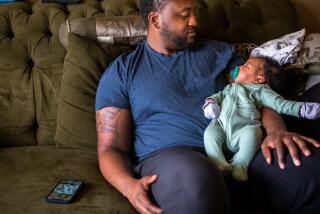Working Women Behind the Mr. Moms
- Share via
We’ve heard lots in recent years about stay-at-home dads, pioneers of role reversal who brave loss of income, jokes about their masculinity and the suspicion of mothers in tot lots to keep their kids out of day care.
Behind every Mr. Mom, it stands to reason, there must also be a Mrs. Dad. But we haven’t heard much until recently from the breadwinner mothers. No wonder: It turns out they’ve been busy.
According to a study presented last week at the American Psychological Assn. convention in Chicago, many of these breadwinner moms revert to traditional roles when they come home from work, making dinner, giving the baths and managing the bedtime routine--even when their husbands stay home 45 hours a week or more. Unlike traditional fathers, the breadwinner moms tend to know their child’s schedule, friends and classes even though they are at work all day.
Despite appearances, researcher Robert Frank, a part-time teacher at Loyola University Chicago, said, “I wouldn’t describe it as a ‘second shift.’ Maybe that’s because I’m a male.” He’s also been a stay-at-home dad for the last 11 years.
Some of the mom’s extra work might be chalked up to vestigial guilt, Frank speculated. Society still expects mothers to be primary caregivers no matter how demanding their jobs are.
Some moms also do more at home because their standards are higher. “My tolerance for the piles that grow is less than his,” said Susan Baylies, a teacher married to Peter Baylies, editor of the Massachusetts-based newsletter “At Home Dad,” whose mailing list provided the subjects for Frank’s study. But she also said, “I jump in there and volunteer to do the baths and the go-to-bed stuff because it’s my only time with the kids.”
In Frank’s family, he does almost everything, said his wife, Linda, a hospital administrator. In fact, he does so much-- dinner, dishes and laundry, arranging play dates and piano lessons and doctor visits--that she still has time for exercise and a choral group.
Inequality at home, however, is the hottest topic on a fledgling Internet e-mail discussion group for wives of stay-at-home dads (cagoddw@aol.com). “Especially when the kids get older--the dads don’t have the excuse of having to chase around a 2-year-old,” Linda Frank said.
This is also a prime topic when women get together at the At Home Dads convention while the fathers attend a range of speakers and workshops. The second annual convention will be held in November at Oakton Community College in Des Plaines, Ill.
Estimates of the number of stay-at-home dads range from 300,000 to 2 million, depending on how they are defined. Robert Frank defines them as caregivers who stay home at least 30 hours a week. While stay-at-home fatherhood once appeared to be a rising trend, census figures indicate that some dads were forced home by the economy. In 1991, 20% of preschoolers were cared for by fathers while mothers worked outside the home. When the economy improved in 1993, the figure dropped to 16%, where it has stabilized.
The moms who complain the most tend to be those who are not breadwinners by choice, Linda Frank said.
“Some are pretty uptight about being their family’s only financial support. They wonder, are they always going to have enough money to keep food on the table and shelter? Their family’s dependent on them. What if they lose their job?”
Some also worry about losing attachment with their children.
Robert Frank said his research indicates a breadwinner mother’s bond with her children isn’t shaken loose when the father becomes the primary caregiver. When children are hurt or upset and both parents are available, the children will still seek comfort from the working mothers as much as from the stay-at-home dads.
In another preliminary study of six families, he said parental stress in at-home-dad families seems to be lower than in traditional families.
“Our society says if the kids don’t come out so good, there’s a sense the female didn’t do a good job. And if the dad is not making big bucks and supporting his family, it’s not done right,” Robert Frank said.
“Maybe because we reverse the roles, the stress is a little less.”
More to Read
Sign up for Essential California
The most important California stories and recommendations in your inbox every morning.
You may occasionally receive promotional content from the Los Angeles Times.













